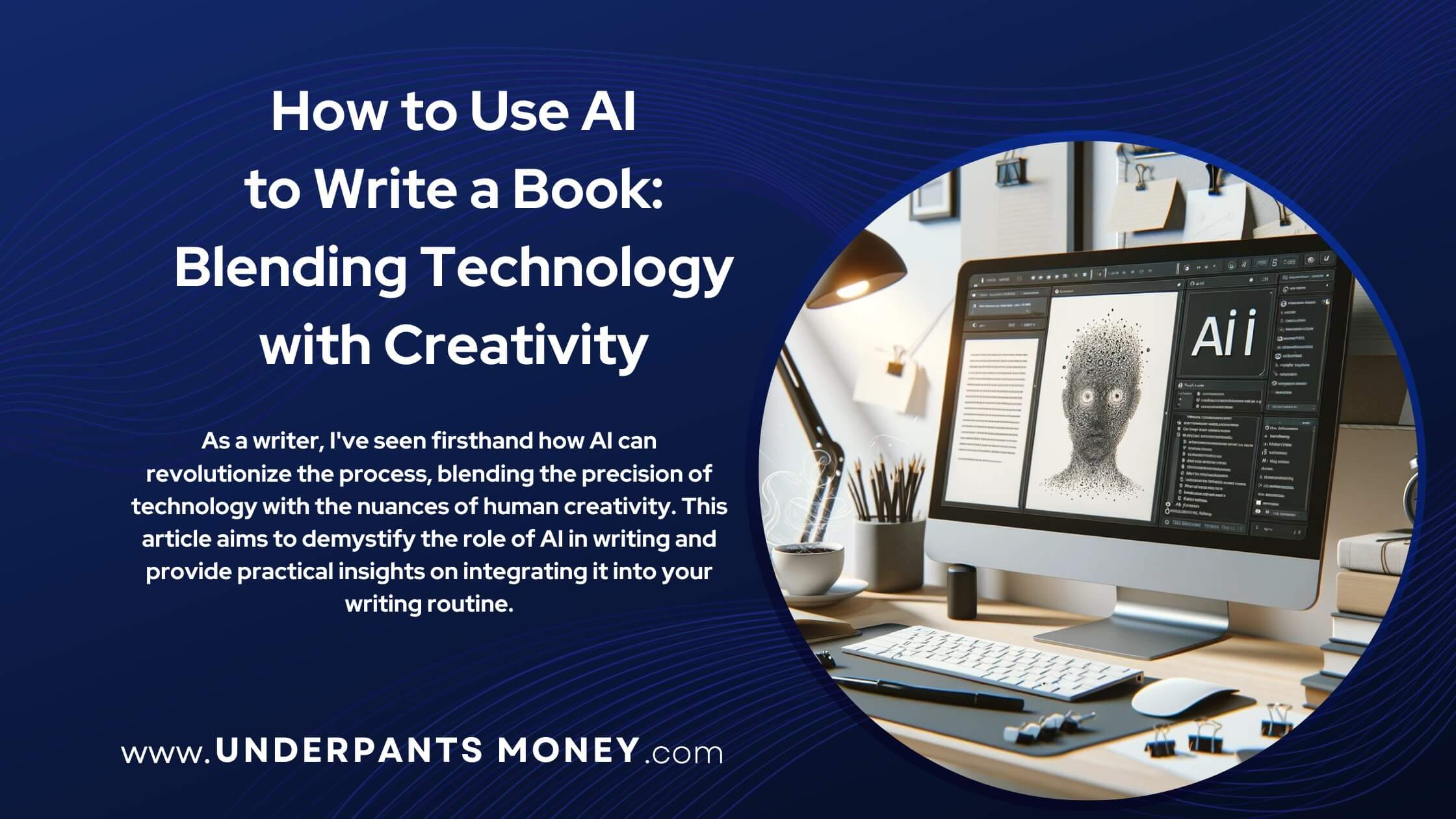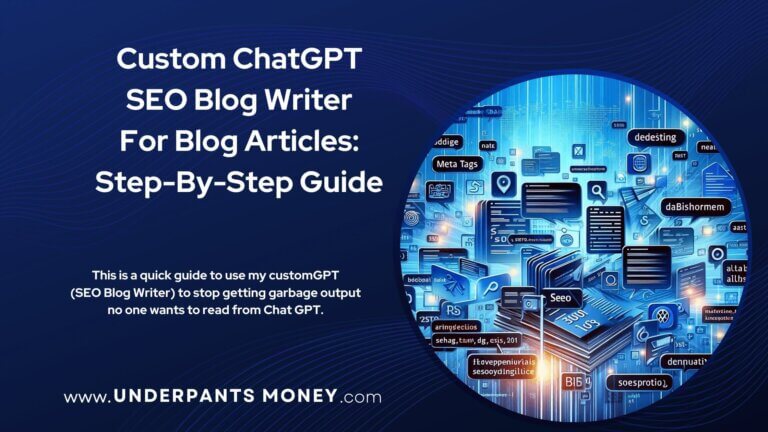How to Use AI to Write a Book: Blending Technology with Creativity

The landscape of book writing is evolving rapidly, and Artificial Intelligence (AI) is at the forefront of this transformation. As a writer, I’ve seen firsthand how AI can revolutionize the process, blending the precision of technology with the nuances of human creativity. This article aims to demystify the role of AI in writing and provide practical insights on integrating it into your writing routine.
AI in writing isn’t just about automating tasks; it’s about opening doors to new possibilities in storytelling. It offers tools for brainstorming ideas, sculpting narratives, and even refining characters. But like any tool, it’s most effective when used in conjunction with a writer’s unique voice and vision.
In the sections ahead, I’ll walk you through how AI can elevate your writing process. We’ll look at both its benefits and its limitations, discussing how to balance AI’s efficiency with your creative flair. I’ll also share some practical tips for selecting and using AI writing tools, ensuring they complement rather than overpower your work. Lastly, we’ll peek into the future, examining emerging trends in AI writing and their potential impact on the publishing industry.
As we explore the intersection of AI and book writing, remember: the goal is to enhance, not replace, the human element in storytelling. Let’s discover how AI can become a valuable ally in your writing journey.
Key Takeaways
- AI as a Creative Tool: AI can enhance the book writing process, aiding in idea generation, character development, and narrative structuring.
- Combating Writer’s Block: AI offers suggestions and prompts, helping writers overcome creative blocks and maintain a consistent writing flow.
- Enhancing Editing: AI assists in editing by checking grammar, style, and consistency, thus improving the quality and efficiency of the writing.
- Balancing AI and Creativity: The best results come from using AI as a supplement to human creativity, not a replacement.
- Future of AI in Writing: Advancements in AI will continue to open new possibilities for storytelling and collaborative writing.

What is AI Writing?
At its core, AI writing is the use of machine-generated content to aid the writing process. This doesn’t mean AI writes entire books autonomously. Instead, AI tools offer suggestions, help overcome writer’s block, and provide structural and stylistic recommendations. It’s a support system, not a replacement for human creativity.
Understanding AI in Writing: The Basics and Beyond
The integration of Artificial Intelligence (AI) in writing is a game-changer for authors. It’s crucial to understand what AI writing is and how it has evolved. AI writing involves using algorithms and machine learning to assist with various aspects of writing, from generating ideas to refining prose.
The Evolution of AI in Writing Tools
The evolution of AI writing tools has been remarkable. Early AI tools were basic spell-checkers, but now, they’ve grown into sophisticated systems capable of mimicking human writing styles. These tools use natural language processing (NLP) and machine learning to understand context, create coherent narratives, and even adapt to an author’s unique voice. This evolution has made AI writing tools an invaluable asset for writers of all levels.
AI’s role in writing is not just about generating text; it’s about enhancing the creative process. It offers new ways to approach storytelling, making it easier to flesh out complex ideas and refine narrative structures. As a writer, embracing AI means unlocking a world of potential to elevate your work.

How AI Enhances the Book Writing Process
Embracing AI in book writing can significantly enhance the creative process. It brings a blend of efficiency and innovation, transforming how ideas are developed and narratives are structured.
Idea Generation and Plot Development
One of the most exciting aspects of AI is its ability to assist with idea generation and plot development. AI tools can suggest plot twists, character developments, and thematic elements based on genre-specific conventions. This doesn’t replace the creative spark of the writer but provides a springboard for new ideas. For instance, when I’m stuck on a plot point, AI suggestions often prompt a fresh perspective or a solution I hadn’t considered.
Character Creation and Development
AI also plays a crucial role in character creation and development. It can generate character backgrounds, traits, and even dialogue snippets that feel authentic. This helps in creating well-rounded, believable characters. For me, using AI to flesh out character details ensures consistency and depth, adding layers to the narrative that might not have been there before.
The impact of AI in the writing process is profound. It streamlines the journey from a nascent idea to a full-fledged manuscript. By leveraging AI, writers can explore new narrative territories and refine their storytelling techniques, leading to richer, more engaging stories.

Navigating the Challenges: AI Writing Limitations and Overcoming Them
While AI offers remarkable advantages in the writing process, it’s important to be aware of its limitations and how to effectively navigate them.
Common Pitfalls in AI Writing
One of the main challenges with AI writing is the risk of generating generic or irrelevant content. AI algorithms can sometimes produce text that lacks the nuanced understanding of human emotions or complex plot subtleties. As a writer, I always double-check AI suggestions for relevance and emotional impact. It’s crucial to remember that AI tools are not infallible and should be used as a complement to, not a substitute for, human creativity and judgment.
Combining AI and Human Creativity
The key to overcoming the limitations of AI in writing is to strike a balance between AI-driven suggestions and human creativity. Use AI as a tool for inspiration and efficiency, but let your unique voice and creative instincts guide the final narrative. For example, I often use AI for initial drafts or idea generation, but the final editing and storytelling nuances are always deeply human and personal.
Navigating these challenges involves recognizing AI as a tool in your arsenal, not the entire armory. By understanding its strengths and weaknesses, you can use AI to enhance your writing process without compromising the quality and authenticity of your work.

Practical Tips for Using AI in Your Writing Journey
To make the most of AI in your book writing process, here are some practical tips for integrating AI tools effectively.
Practical Application of AI in Writing
| Application | How to Use | Expected Outcome |
| Brainstorming Sessions | Use AI to generate initial ideas and plot possibilities. | Broadens creative options, provides a starting point. |
| Character Building | Leverage AI for character backgrounds and dialogues. | Creates more rounded, believable characters. |
| Drafting Process | Employ AI for creating first drafts or building story arcs. | Speeds up the writing process, provides structure. |
| Editing and Proofreading | Utilize AI for grammar and style checks. | Increases accuracy, polishes the final manuscript. |
| Final Review | Combine AI insights with personal review for final touches. | Ensures a polished, well-rounded story. |
Selecting the Right AI Writing Tools
Choosing the right AI tools is crucial. Look for tools that offer features aligned with your specific writing needs. If you’re focusing on fiction, tools that assist with plot and character development might be ideal. For non-fiction, look for AI that aids in research and fact-checking. I personally use a combination of tools, selecting each based on the particular phase of writing I’m in.
Integrating AI into Your Writing Routine
Once you’ve selected your tools, the next step is to integrate them into your routine. Start by using AI for brainstorming sessions or first drafts. Gradually, you can increase its use for more complex tasks like editing or style refinement. Remember, the goal is not to let AI take over your writing process but to assist and enhance your natural workflow. For me, setting aside specific times for AI-assisted writing helps maintain a balance between technology and personal creativity.
By following these tips, you can seamlessly integrate AI into your writing journey, leveraging its strengths to augment your creative process.

The Future of AI in Writing: Trends and Predictions
As we look ahead, the role of AI in writing is poised for even more significant advancements. Understanding these trends can help writers stay ahead of the curve.
Emerging Technologies in AI Writing
Emerging technologies, such as more advanced natural language processing (NLP) and machine learning models, are continuously enhancing the capabilities of AI writing tools. These advancements are making AI more intuitive and capable of understanding complex literary nuances. For writers, this means AI tools will become even more efficient in assisting with narrative structure, character development, and editing.
Future Implications for Authors and the Publishing Industry
The future of AI in writing holds exciting possibilities for authors and the publishing industry. AI could lead to new forms of storytelling and collaborative writing, where authors from different parts of the world can co-create with AI assistance. Additionally, AI could democratize writing, making it more accessible to aspiring authors who might lack traditional writing training.
The potential of AI in writing is vast and ever-evolving. As a writer, staying informed about these advancements is crucial for adapting to the changing landscape and leveraging AI to enhance your creative endeavors.
Conclusion
The intersection of AI and book writing is a frontier brimming with possibilities. As we’ve explored, AI can significantly augment the writing process, from sparking creative ideas to refining narrative structures. It’s a tool that, when used wisely, can transform the way we approach storytelling, making it more efficient, diverse, and engaging.
However, the key to effectively using AI in writing lies in the balance. It’s about merging the analytical prowess of AI with the irreplaceable touch of human creativity. As writers, our task is to harness this technology to enhance our stories without losing the personal voice that makes each piece unique.
As AI continues to evolve, so too will its role in the writing process. By staying informed and adaptable, writers can utilize these advancements to not only improve their craft but also to explore new realms of storytelling. The future of writing with AI is not just about embracing new technology; it’s about opening ourselves to new ways of thinking, creating, and telling stories that resonate with readers in a rapidly changing world.
Frequently Asked Questions (FAQs)
Can AI write an entire book on its own?
AI is currently capable of generating text, but writing an entire book requires the creative input, direction, and personal touch of a human author. AI is best used as a tool for assistance and enhancement in the writing process.
How does AI help in the creative process of writing a book?
AI can assist in various stages of writing, including generating ideas, creating outlines, developing characters, and suggesting plot developments. It can also help in editing and refining the manuscript.
Is it ethical to use AI in writing a book?
Using AI in writing is ethical as long as it’s used responsibly. This means being transparent about its use and ensuring that the core ideas and expressions in the book are authentically yours.
Will AI replace human authors?
AI is not likely to replace human authors because it lacks the ability to replicate the depth of human emotions, experiences, and creativity that are essential in storytelling.
How can I ensure my book remains original when using AI?
You can ensure originality by using AI for suggestions and enhancements while keeping your own creative voice and ideas at the forefront of the writing process.
Is it difficult to learn how to use AI writing tools?
Most AI writing tools are user-friendly and designed for easy integration into the writing process. With basic knowledge of writing software, most writers can quickly learn to use AI tools effectively.
Will using AI compromise the originality of my work?
AI tools generate suggestions based on existing data and trends, but the incorporation and modification of these suggestions by the writer ensures the originality of the final work. It’s the writer’s unique input that defines the originality of a book.
Can AI help if I’m facing writer’s block?
Yes, AI can be particularly useful in overcoming writer’s block by providing creative prompts, ideas, and even content suggestions to help get the writing process back on track.






